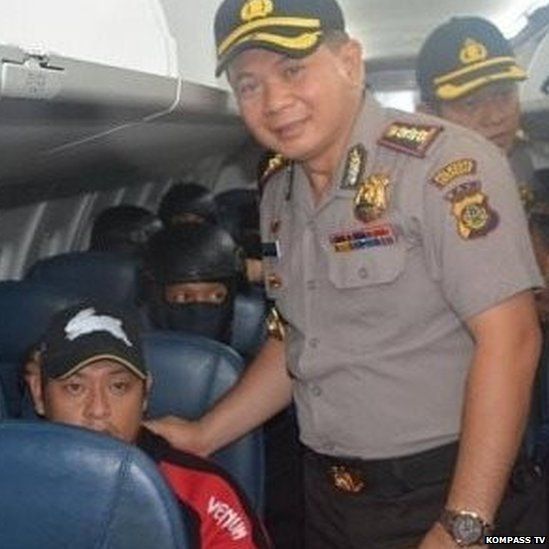Bali Nine: Australia complains over treatment of pair
- Published

Australia has lodged an official complaint with Indonesia over the treatment of drug smugglers Andrew Chan and Myuran Sukumaran.
The two Australian ringleaders of the "Bali Nine" gang are due to be executed by Indonesia in coming days.
Photographs emerged on Thursday showing a senior policeman smiling as he stands next to Chan aboard a transport plane.
The complaint concerns the pictures, as well as what Canberra sees as excessive force in moving the men.
Chan and Sukumaran are among 11 drug convicts due to be executed soon at Indonesia's Nusakambangan prison island.
'Not a selfie moment'
The images were published in local media shortly after Chan and Sukumaran were moved from their Bali prison to Nusakambangan early on Wednesday.
Foreign Minister Julie Bishop complained to Indonesia's ambassador in a phone call on Friday while Prime Minister Tony Abbott called the pictures "unbecoming" and said they "showed a lack of respect and a lack of dignity".
Treasurer Joe Hockey said the image was "incredibly insensitive, it's almost macabre the way this has been handled by the Indonesian authorities," the AFP news agency reports.
Indonesia's Senior Police Commissioner Djoko Hari Utomo, who was in the pictures, told Fairfax Media he was attempting to raise the spirits of the Australians and did not know the pictures were being taken.
"It was not a selfie moment," he said.
A spokesperson for Ms Bishop said she had also complained about the unusual use of military guards and vehicles to transport the men to Nusakambangan.
Indonesian Attorney General HM Prasetyo said on Friday the executions could be delayed by up to 10 days, according to Australian media.
An offer on Thursday by Australia's Foreign Minister Julie Bishop to repatriate three Indonesian convicts in return for Chan and Sukumaran was rejected.
Ms Bishop's spokesperson said on Friday that there were ongoing discussions "at the highest level".
Foreign Ministry spokesman Arrmanatha Nasir told the BBC that Indonesia had no law to provide for such an exchange.
President Joko Widodo has said the drugs trade destroys lives in Indonesia and has adopted a hard line on convicted dealers, refusing to overthrow death sentences.
Who are the Bali Nine?
The Bali Nine ringleaders - the essential background in one minute
- The eight men and one woman were arrested in April 2005 at an airport and hotel in Bali, Indonesia after a tip-off from Australian police.
- They were trying to carry 8.3kg (18lb) of heroin back to Australia
- In 2006 a court ruled that Andrew Chan and Myuran Sukumaran had recruited the others and paid their costs. They were sentenced to death
- The other seven are serving sentences of between 20 years and life, after some had death sentences revoked on appeal
- Chan and Sukumaran have repeatedly appealed against their sentences and say they are reformed characters - Chan teaches Bible and cookery classes in prison while Sukumaran is an artist
Both Prime Minister Tony Abbott and Ms Bishop have campaigned publicly and behind the scenes for Chan and Sukumaran's sentences to be commuted.
Mr Abbott has said he is "revolted" by the planned executions.
He and Ms Bishop were joined on Thursday morning by MPs and members of the public for a candlelit vigil for the men outside the parliament building in Canberra.
The date of the execution remains unclear. The authorities must legally give the convicts 72 hours' notice, which has reportedly not happened yet.
The other seven of the "Bali Nine" smugglers - all Australian - are serving prison sentences.
- Published4 March 2015
- Published1 March 2015
- Published29 April 2015
- Published8 February 2015